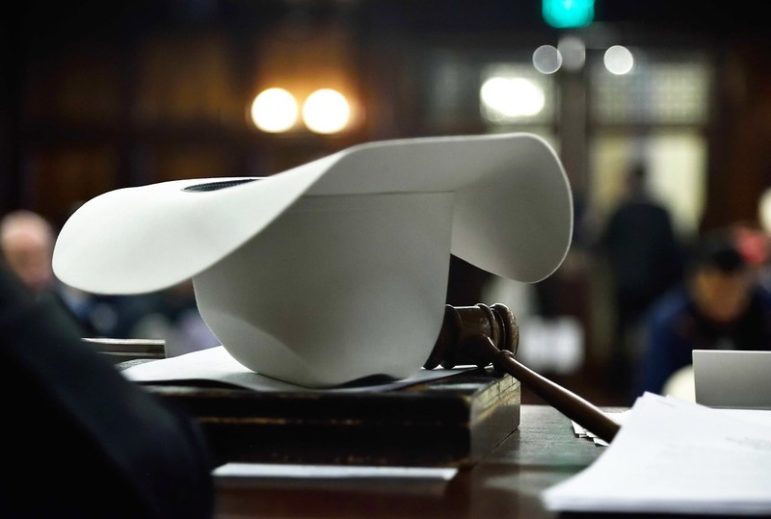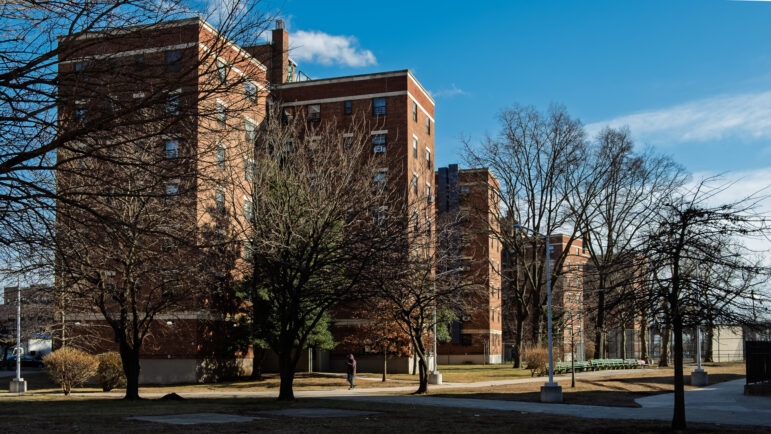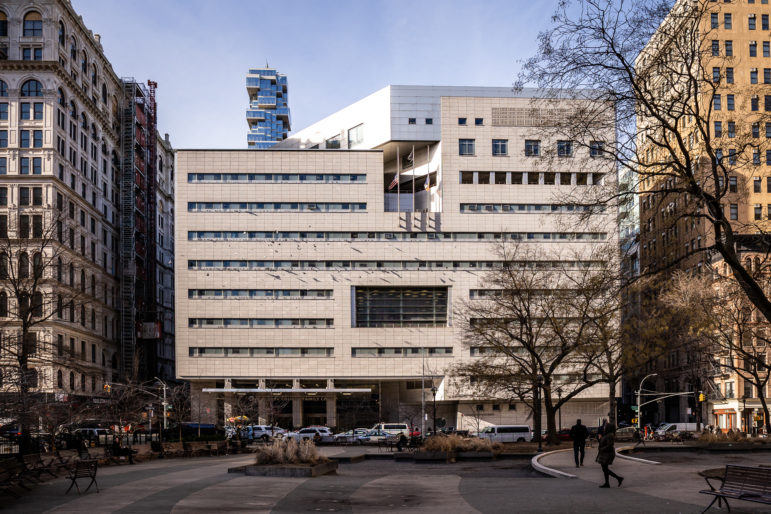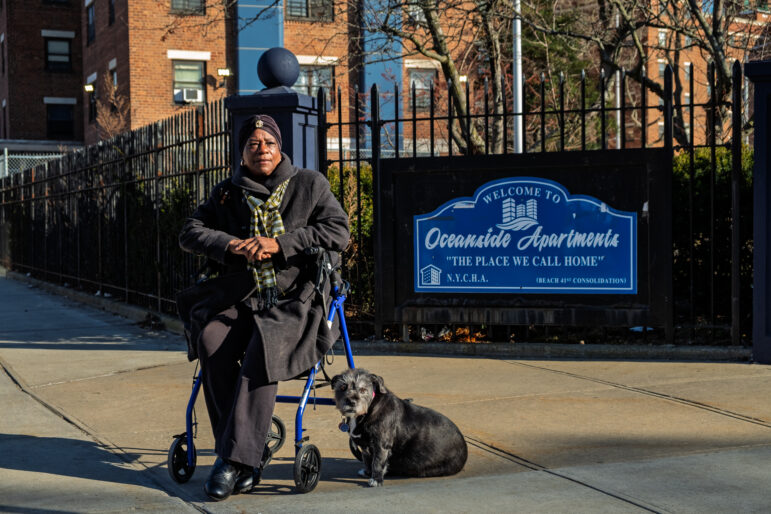
John McCarten:NYC Council
The hat.Rubén Díaz Sr.´s column “What You Should Know” has run in La Voz Internacional, a conservative bilingual online newspaper, since 2016. His most controversial columns, like the one headlined “Against Same-Sex Marriage,” registered thousands of views, according to the newspaper’s president, Matha Aparicio.
“The most-read column was the one written by Díaz Sr.´s wife, with more than 10,000 views,” mentions Aparicio over the phone. In this column, Leslie I. Diaz defended her husband by stating that “All these elected officials, and news reporters [were] running around in a frenzy like Henny Penny [a Chicken-Little movie reference], warning everyone ‘The sky is falling, The Sky is Falling!’ and all because Ruben Diaz Sr. said the Gay Community has control of the City Council.”
The column came out short after after Díaz Sr. said in a radio interview in 2019 that the the Council was “controlled by the homosexual community,” ignored calls to resign his seat. Because of these comments, councilmembers agreed to dissolve the committee on for-hire vehicles that Díaz Sr. chaired.
As he runs in the most crowded Congressional race of the 2020 season, Díaz Sr. has remained busy at his keyboard. In the midst of the pandemic, for example, April’s column criticized Governor Cuomo for not acknowledging God’s power to decrease coronavirus cases in New York. “The number is down because we brought the number down. God did not do that. Fate did not do that. Destiny did not do that. A lot of pain and suffering did that,” said Cuomo, to which Díaz Sr. replied that it was a blaspheme that “must not be tolerated.” He added, “We must not only credit ourselves. To do so would be blasphemous.”
His columns have both cocooned and revealed Díaz Sr. ‘s ways of thinking since he began writing them as a state senator back in 2012, and since then, he has commented on everything from fashion choices to national politics. Díaz Sr.’s columns have been in the eyes of the City Council’s committee on standards and ethics because the columns emanate from his government email address and the email subscription attached to it.
Besides sharing his take on the world, what is important about these columns is that they have helped Díaz Sr. maintain his place on voters’ radar—so much so that his current campaign for the Democratic nomination in the 15th district does not have a campaign website. There is no platform that highlights his proposals or the issues that he cares about.
Lots of visibility, few answers
For an elected official, skipping all the debates in a race might not seem like the most effective way to gain voters; however, this has been Díaz Sr.’s strategy. His campaign relies on Twitter and Facebook posts, pictures and videos capturing him doing old-school politics, like giving away food, toys and—since the coronavirus pandemic hit New York—masks.
His grocery giveaway flyers and posts say that they offer food for hundreds of families. Some of these posts offered to distribute groceries “for the first one thousand (1,000) families” like the one at the evangelical church La Española, 800 E. 156 St., on May 8th.
At events like this, Díaz Sr. has benefited from appearing next to his son, Ruben Diaz Jr., the Bronx borough president. Even though Diaz Jr. has not officially endorsed his father, the pair has been seen together many times in recent days (June 2nd, 5th,and 6th), where the two held hands with people and prayed (and, it seeems pretty clear, did not maintain social distance).
In the short term, being seen with the younger and more progressive borough president could be beneficial to the Díaz Sr. campaign. It helps to offset Díaz Sr.’s perception as a deeply conservative pastor, suggesting that father and son are not that different politically. In May, for example, Díaz Sr. had an 80 percent name recognition among voters in the district, but what is hard to differentiate in this poll is how many people confused father and son’s names. The ballot for the June 23rd primary will name Diaz without the “Sr.” suffix, potentially confusing some voters as to which member of the family they are voting for.
A life on the right
Rubén Díaz Sr. entered politics in 1993, when he was confirmed by the City Council as a member of the police civilian complaint review board—where he was soon strongly criticized for his homophobic comments. In a nice bit of historical symmetry, his most recent column, from June 2nd, is about the CCRB, which he feels should be allowed to investigate police misconduct before other policing reforms are enacted.
Díaz Sr. has endorsed campaigns of Republican Rudy Giuliani for mayor, George Pataki for governor, and Rick Lazio for United States Senate in 2000, and more recently he has invited Trump to his church, and welcomed Republican Senator Ted Cruz to the Bronx.
As a councilmember, Díaz Sr. has cosponsored 22 bills, but has been the prime sponsor of only four enacted bills. For a lawmaker, that is a fairly low-wattage performance; however, Díaz Sr. has been a strategic player by joining on as co-sponsor to laws that impacted the for-hire vehicle industry.
Díaz Sr. was at the state Senate from 2003 to 2017. From 2009 through 2017 (the period covered by the Senate’s legislative database) only four bills he sponsored were actually signed by the governor.
Cultivating a key vote
Díaz Sr., who is Puerto Rican, understood the growing importance of the Dominican vote when he ran for Council in 2017. He recognized that there are more Dominicans living in the Bronx than Puerto Ricans, and since then he has been working to capture those votes.
As part of this political strategy, Díaz Sr. has proudly welcomed former conservative Dominican presidents Leonel Fernández and Hipólito Mejía (who has also used anti-gay slur during an appearance in the U.S.), Dominican presidential candidate Luis Abinader (for whom Rudy Giuliani did consulting work for the presidential bid in 2016 and 2019), Federico Antún Batlle (chairman of the Social Christian Reformist Party), and Ramfis Domínguez Trujillo, the grandson of Rafael Leónidas Trujillo, the Dominican Republic dictator.
Trujillo and Diaz have met twice, in 2017 and 2018, in the Bronx. This seems like a mutually beneficial relationship since Domínguez Trujillo is running for president in the Dominican Republic under the political slogan “firm hand” and plans to build a wall on the border with Haiti.
During their meeting in 2018, Díaz Sr. was so honored that he took off his iconic cowboy hat, a rare gesture.
He has also been working with Dominican pastors and the Dominican media, to which he shows less reluctance talking (he did not reply to City Limits’ request for an interview). The coalition of churches he leads, the New York Hispanic Ministers Organization (la organización de ministros hispanos de NY), is primarily comprised of Dominican ministers.
“The church I’m the pastor of is 95 percent Dominican”, said Diaz in 2018. “Dominicans are the largest Latino community living in the Bronx county”, he added during that meeting.
Some of Diaz’s campaign donors were also at that long table that welcomed Domínguez Trujillo.
One was Rev. Hector A. Chiesa, a bishop ordained in the Church of God (iglesia de dios) and director of Radio Vision Cristiana International, who has donated $2,800 to Díaz Sr. campaign. Like Díaz Sr., Chiesa also has a relationship with Republicans, donating to both the party and Trump’s 2016 presidential campaign. Next to Chiesa was Nicolas Angustia, pastor and bishop at United Revival Mennonite Church, who has also donated $2,200 to the Díaz Sr. campaign. According to the New York Times, “more than one-third of all [Díaz’s] itemized contributions — donations above $200 — came from fellow pastors and ministers.”
The New York Hispanic Clergy Organization, Shalom Christian Church and Christian Community Neighborhood Church each gave Díaz Sr. “birthday gifts” in 2017 and in 2018, according to his annual financial disclosure forms. The combined value of these birthday gifts ranged between $3,000 and $15,000 per year, meaning they could be worth up to $30,000 over the two cycles.
Big name, crowded race
In May, Data for Progress surveyed 323 likely voters in the district to get a better sense of the ongoing race showing Díaz Sr. with a narrow lead (22 percent), closely followed by Ritchie Torres (20 percent), but if one considers the margin of error, a probable tie—meaning, more uncertainty in this race, with a 34 percent of likely voters still undecided.
Besides Torres, Díaz Sr. faces former Serrano staffer Frangell Basora, Assemblyman Michael Blake, affordable housing developer Samelys Lopez, former City Council Speaker Melissa Mark-Viverito, Black Lives Matter leader, Chivona Newsome, youth services provider Tomas Ramos, City Councilmember Ydanis Rodriguez and outsider candidates Mark Escoffrey-Bey, Julio Pabon and Marlene Tapper.
Winning the June primary is tantamount to election in the overwhelmingly Democratic district. And the ramifications from a Díaz Sr. victory next week could extend well beyond the 2020 election year.
Some believe that if the 77-year-old Díaz Sr. wins this election, he will serve only a single term, then make way for his son to take the congressional seat—creating a new path to power for Díaz Jr., who is term-limited as borough president and earlier this year ended his 2021 mayoral campaign.
Indeed, one stake in this race is the survival of the last remaining political dynasty in the Bronx. The Rivera dynasty, which once had a father and daughter in the Assembly and a son in the Council, now consists only of the father, Jose Rivera, and he is long removed from running the Bronx Democrats. The Espada family once had a father in the State Senate and a son on the Council—both went to prison. Pioneering Assemblywoman Carmen Arroyo (who has handed out food with Díaz Sr. and Jr. this year) is still in the legislature, but daughter Maria del Carmen Arroyo is no longer a Councilmember.
To be sure, the Díazes aren’t the only political family active in the borough: Assemblyman Jeffrey Dinowitz’s son Eric is seeking a Council seat. But a Congressional perch is a much shinier family heirloom.
Indeed, as Rep. José Serrano retires from the Congressional seat that Díaz Sr. is seeking, it’s notable that his son, State Sen. Jose Serrano, is not seeking it.









